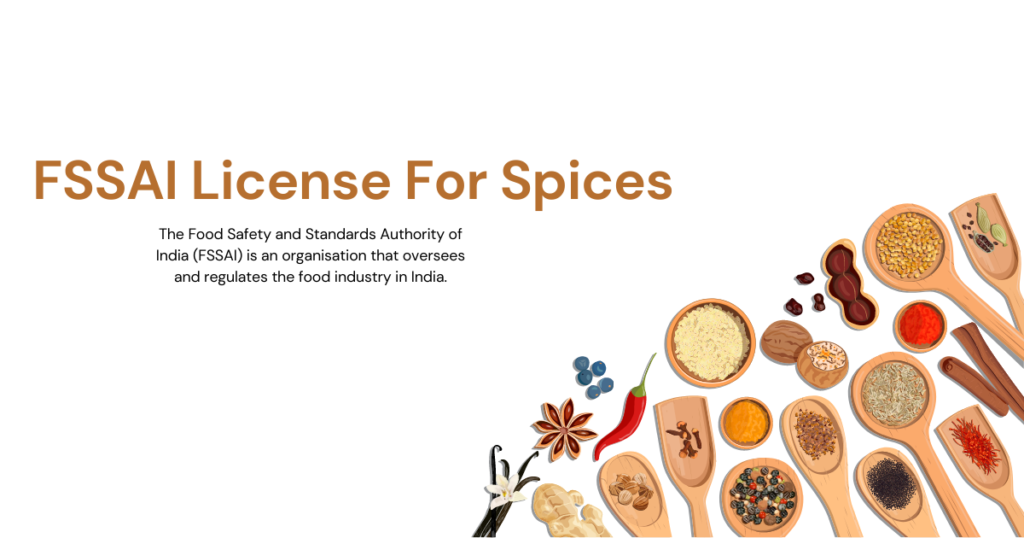FSSAI Registration for Spices: Process, Benefits, and FAQs
If you’re involved in the spices industry in India, obtaining an FSSAI (Food Safety and Standards Authority of India) registration is essential. FSSAI registration ensures that your spices meet the required food safety and quality standards, instilling trust in your customers and facilitating smooth business operations.
In this comprehensive guide, we’ll walk you through the entire process of FSSAI registration for spices, its benefits, and answer frequently asked questions.

Table of Contents:
- Introduction to FSSAI Registration for Spices
- Understanding FSSAI
- Why FSSAI Registration for Spices is Necessary
- Types of FSSAI Registration
- Basic FSSAI Registration
- State FSSAI License
- Central FSSAI License
- Benefits of FSSAI Registration for Spices
- Ensuring Food Safety
- Legal Compliance
- Consumer Trust and Confidence
- Expanding Market Reach
- Documents Required for FSSAI Registration
- Common Documents
- Additional Documents for State and Central Licenses
- FSSAI Registration Process for Spices
- Online Application
- Document Verification
- Inspection
- License Issuance
- Frequently Asked Questions (FAQs)
- What is the validity period of an FSSAI registration?
- Can I apply for an FSSAI license if I operate in multiple states?
- What is the difference between FSSAI registration and FSSAI license?
- Is FSSAI registration mandatory for small-scale spice businesses?
- How long does it take to obtain an FSSAI license for spices?
- What happens if I operate without an FSSAI license?
- Can I modify my FSSAI registration details?
- Conclusion
1. Introduction to FSSAI Registration for Spices
Understanding FSSAI
The Food Safety and Standards Authority of India (FSSAI) is the regulatory body responsible for ensuring the safety and quality of food products in India. FSSAI Registration or license is mandatory for all food businesses, including those dealing with spices.
Why FSSAI Registration for Spices is Necessary
- Food Safety: FSSAI registration ensures that the spices you produce or sell meet specific safety and quality standards, safeguarding consumers’ health.
- Legal Requirement: It is a legal requirement under the Food Safety and Standards Act, 2006, and non-compliance can lead to penalties.
- Consumer Trust: Having an FSSAI registration or license builds trust among consumers, as they know that your products adhere to safety standards.
- Market Expansion: With FSSAI registration, you can access a broader market, including e-commerce platforms and exports.
2. Types of FSSAI Registration
FSSAI offers different types of registration and licenses based on the scale of your business:
Basic FSSAI Registration
- For small-scale businesses with an annual turnover of up to ₹12 lakhs.
- Applicable to petty food manufacturers, small eateries, and spice retailers.
State FSSAI License
- For medium-sized businesses with an annual turnover between ₹12 lakhs and ₹20 crores.
- Applicable to spice manufacturers, processors, and distributors operating within a state.
Central FSSAI License
- For large-scale businesses with an annual turnover exceeding ₹20 crores.
- Applicable to spice manufacturers, exporters, importers, and businesses operating in multiple states.
3. Benefits of FSSAI Registration for Spices
Ensuring Food Safety
FSSAI registration ensures that the spices undergo regular quality checks, reducing the risk of contamination and health hazards.
Legal Compliance
It makes your spices business compliant with Indian food safety laws, preventing legal issues and penalties.
Consumer Trust and Confidence
Customers trust FSSAI-registered products more, which can boost your brand’s reputation.
Expanding Market Reach
Having an FSSAI registration allows you to sell your spices across India and even expand internationally.
4. Documents Required for FSSAI Registration
Common Documents
- Form-B: Filled and signed.
- Photo Identity of the Applicant: Aadhar card, voter ID, passport, etc.
- Passport-sized Photographs of the Applicant.
- Proof of Possession of Premises: Rent agreement, utility bill, etc.
- List of Spices to be Manufactured or Traded.
Additional Documents for State and Central Licenses
- Duly filled and signed Form-B.
- Blueprint/Layout plan of the processing unit.
- List of Directors/Partners/Proprietor with full addresses and contact details.
- Declaration form.
- Authority letter.
- Copy of the license from the manufacturer.
- Food safety management system plan.
- NOC from the local municipality or any other local body.
- IE code document issued by DGFT for the Central license.
5. FSSAI Registration Process for Spices
The FSSAI registration process involves the following steps:
Online Application
- Visit our website
- Fill the FSSAI registration form with your business details
- Submit the form and complete the payment process.
Document Verification
The Our team will verify the documents submitted in the application.
Inspection
In some cases, the FSSAI officials may conduct an inspection of your premises.
License Issuance
Once your documents are verified, and if everything is in order, you will receive your FSSAI registration or license.
6. Frequently Asked Questions (FAQs)
1. Can I apply for FSSAI registration online, or is it necessary to visit the FSSAI office?
Ans: You can apply for FSSAI registration online through the website. Visiting the FSSAI office in person is generally not required for the registration process.
2. Is FSSAI registration applicable to homemade spice products sold locally?
Ans: Yes, even if you are producing spice products at home and selling them locally, you are required to obtain FSSAI registration if your annual turnover exceeds the specified threshold. FSSAI ensures that even small-scale food businesses adhere to safety and quality standards.
3. Do I need to get my spice products tested for quality before applying for FSSAI registration?
Ans: While it’s not mandatory to get your spice products tested before applying for FSSAI registration, it’s a good practice. Testing your products for quality and safety ensures that they meet the required standards, increasing your chances of a successful registration.
4. What are the consequences of operating a spice business without FSSAI registration?
Ans: Operating a spice business without a valid FSSAI registration is illegal and can result in severe consequences. These consequences may include penalties, fines, product recalls, and legal action. It’s crucial to comply with FSSAI regulations to avoid such issues.
5. Can I sell my FSSAI-registered spice products online through e-commerce platforms?
Ans: Yes, having FSSAI registration or a license allows you to sell your spice products through various channels, including e-commerce platforms. It expands your market reach and helps you reach a broader customer base.
6. Is it necessary to renew my FSSAI registration, and how often should I do it?
Ans: Yes, FSSAI registration needs to be renewed periodically. The renewal frequency depends on the type of registration you have. Basic FSSAI registration is typically renewed annually, while state and central licenses may have longer renewal periods, such as every one to five years. It’s crucial to renew your registration/license before it expires to avoid disruptions to your business.
7. Can I apply for FSSAI registration for multiple spice products under a single registration?
Ans: Yes, you can apply for FSSAI registration for multiple spice products under a single registration if they fall under the same category and are manufactured at the same premises. However, you need to list all the products you intend to manufacture or trade in your application.
8. What should I do if I want to expand my spice business to other states in India?
Ans: If you plan to expand your spice business to other states in India, you may need to apply for additional state FSSAI licenses for those states. Operating in multiple states typically requires multiple licenses to ensure compliance with state-specific regulations.
7. Conclusion
Obtaining FSSAI registration for your spices business is not just a legal requirement; it’s a mark of quality and safety that can enhance your brand’s reputation and market reach. By understanding the process, benefits, and compliance requirements, you can navigate the FSSAI registration journey successfully, ensuring that your spices are enjoyed by consumers safely and confidently.

